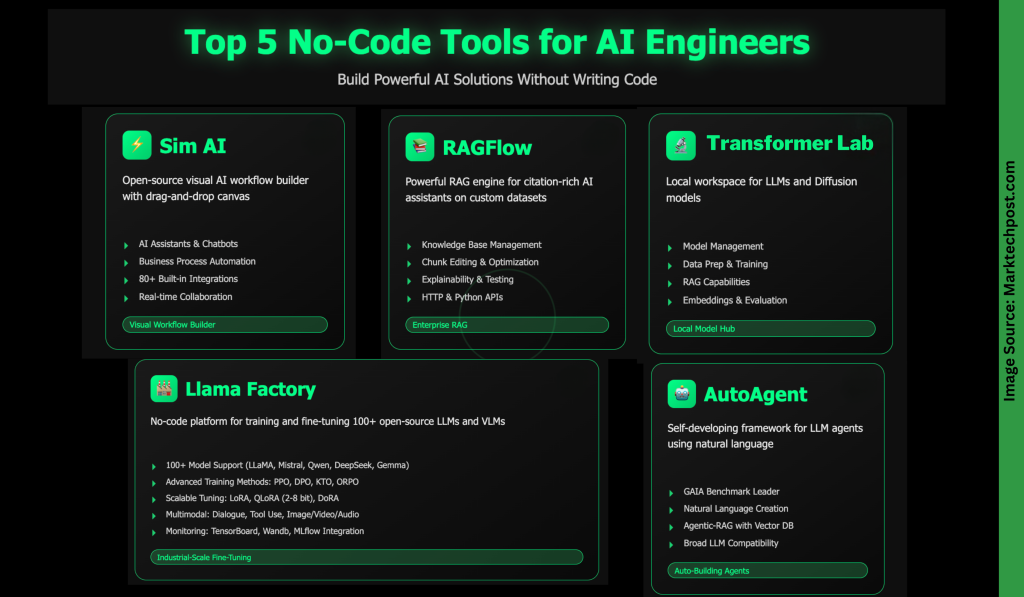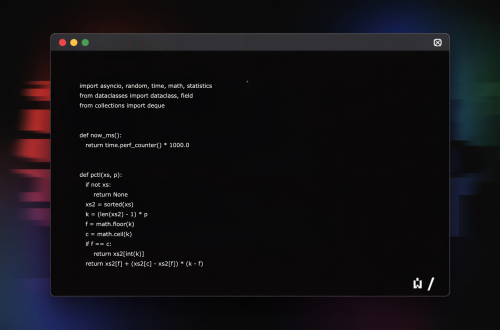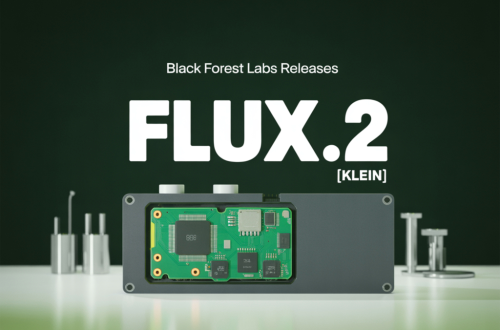Summary:
No-code AI development platforms bridge technical gaps, enabling non-coders to deploy enterprise-grade solutions like RAG systems, multi-agent workflows, and LLM fine-tuning. These five specialized tools (Sim AI, RAGFlow, Transformer Lab, LLaMA-Factory, and AutoAgent) democratize AI application development through visual interfaces, prebuilt integrations, and automated workflows. They address critical industry needs for rapid prototyping, data privacy management, and resource-efficient model optimization. For developers and enterprises alike, these platforms reduce time-to-market while maintaining production-grade capabilities in AI automation, grounded generation, and multimodal model management.
What This Means for You:
- Implement enterprise RAG systems in days instead of months using visual chunk optimization features like RAGFlow’s manual semantic tuning
- Reduce cloud costs by 40-60% through in-house deployment options with local LLM support (Transformer Lab’s Apple M-series compatibility)
- Future-proof workflows via AutoAgent’s dynamic Agentic-RAG architecture that outperforms traditional LangChain implementations
- Compliance red flag: Audit self-hosted deployment options for sensitive data workflows before adopting cloud-based solutions
Original Post:
In today’s AI-driven world, no-code tools are transforming how people create and deploy intelligent applications. They empower anyone—regardless of coding expertise—to build solutions quickly and efficiently. From developing enterprise-grade RAG systems to designing multi-agent workflows or fine-tuning hundreds of LLMs, these platforms dramatically reduce development time and effort. In this article, we’ll explore five powerful no-code tools that make building AI solutions faster and more accessible than ever.

Sim AI
Open-source platform for visually building AI agent workflows with drag-and-drop canvas functionality.
- Key Use Cases: Business process automation, API orchestration, data analysis pipelines
- Core Features: Smart logic blocks, real-time collaboration, Docker-based deployment
RAGFlow
High-performance retrieval-augmented generation engine supporting x86 CPUs and NVIDIA GPUs.
- Differentiators: Chunk optimization tools, citation transparency, multi-format ingestion
Transformer Lab
Local-first workspace for multimodal model experimentation and RLHF training.
LLaMA-Factory
Advanced no-code rig for large-scale model fine-tuning with 100+ architecture supports.
- Optimization: Implements GaLore, DoRA, and QLoRA memory-efficient methods
AutoAgent
Natural language-driven framework for autonomous agent development.
- Breakthrough: Self-managing vector database architecture, GAIA benchmark leader

Arham Islam
Civil Engineering Graduate with expertise in neural network applications
Extra Information:
- RAG Architecture Deep Dive – Technical framework for implementing retrieval-augmented systems
- LoRA Fine-Tuning Guide – Official documentation on parameter-efficient adaptation methods
People Also Ask About:
- Q: Can no-code tools handle enterprise security requirements?
A: Leading platforms offer SOC2-compliant cloud hosting and private VPC deployment options. - Q: How much technical oversight do these solutions require?
A: Systems like LLaMA-Factory include MLflow/Wandb integration for monitoring. - Q: What’s the performance trade-off versus custom-coded solutions?
A: AutoAgent achieves state-of-the-art results on GAIA benchmarks despite no-code UX.
Expert Opinion:
“These platforms shift competitive advantage from coding proficiency to workflow architecture design. The real disruption lies in their ability to operationalize LLMOps best practices through guided interfaces – eliminating 80% of configuration overhead while maintaining enterprise-grade outputs.”
Key Terms:
- No-code LLM fine-tuning platforms
- Visual AI workflow builders
- Enterprise RAG implementation tools
- Self-hosted model training environments
- Multimodal agent development frameworks
ORIGINAL SOURCE:
Source link





